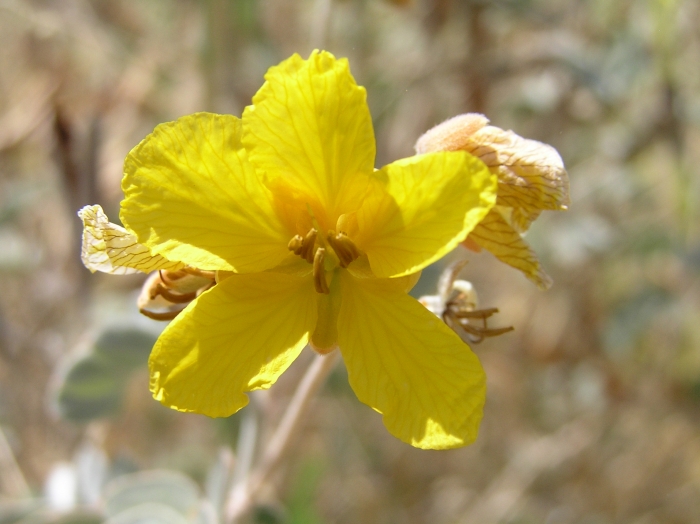Desert Senna
(Senna covesii)
Desert Senna (Senna covesii)
/
/

Eiriandiffaith
CC BY 2.5
Image By:
Eiriandiffaith
Recorded By:
Copyright:
CC BY 2.5
Copyright Notice:
Photo by: Eiriandiffaith | License Type: CC BY 2.5 | License URL: https://creativecommons.org/licenses/by/2.5 | Uploader: Innotata | Publisher: Wikimedia Commons | Title: Desertsenna.JPG | Notes: Transferred from Flickr via [[Commons:Flickr2Commons|Flickr2Commons]] |

























































Estimated Native Range
Summary
Senna covesii, commonly known as Desert Senna, is an evergreen perennial subshrub or herb native to the Sonoran and Mojave Deserts in the Southwestern USA and Northwestern Mexico. It typically grows to 30–60 cm tall and can spread to a similar width. Desert Senna has a unique appearance, being leafless for most of the year, which helps reduce water loss in its arid native habitat. When in leaf, its foliage is pinnate with small, gray-green leaflets. The bright yellow flowers, each with five rounded petals about 12 mm long, bloom from late winter to early spring and are quite showy, attracting various pollinators.
Desert Senna is valued for its drought tolerance and ability to thrive in full sun with minimal water, making it an excellent choice for xeriscaping and low-water-use gardens. It is well-suited to soils with fast drainage and is often used in rock gardens, as a border plant, or in naturalized areas. In addition to its ornamental use, it provides ecological benefits by serving as a larval food source for Sulphur butterflies. While it is generally low-maintenance, it may require occasional pruning to maintain a tidy form. Gardeners should be aware that it can self-seed and may spread beyond its intended area if not managed.CC BY-SA 4.0
Desert Senna is valued for its drought tolerance and ability to thrive in full sun with minimal water, making it an excellent choice for xeriscaping and low-water-use gardens. It is well-suited to soils with fast drainage and is often used in rock gardens, as a border plant, or in naturalized areas. In addition to its ornamental use, it provides ecological benefits by serving as a larval food source for Sulphur butterflies. While it is generally low-maintenance, it may require occasional pruning to maintain a tidy form. Gardeners should be aware that it can self-seed and may spread beyond its intended area if not managed.CC BY-SA 4.0
Plant Description
- Plant Type: Subshrub
- Height: 1-2.5 feet
- Width: 0.5-1.5 feet
- Growth Rate: Moderate
- Flower Color: Yellow
- Flowering Season: Spring
- Leaf Retention: Evergreen
Growth Requirements
- Sun: Full Sun
- Water: Low
- Drainage: Fast
Common Uses
Bee Garden, Bird Garden, Butterfly Garden, Drought Tolerant, Low Maintenance, Rock Garden
Natural Habitat
Sonoran and Mojave Deserts
Other Names
Common Names: Coues’ Senna, Rattleweed, Rattlebox, Dais, Cove Senna, Coues’ Cassia
Scientific Names: , Senna covesii, Cassia covesii, Earleocassia covesii,
GBIF Accepted Name: Senna covesii (A.Gray) H.S.Irwin & Barneby